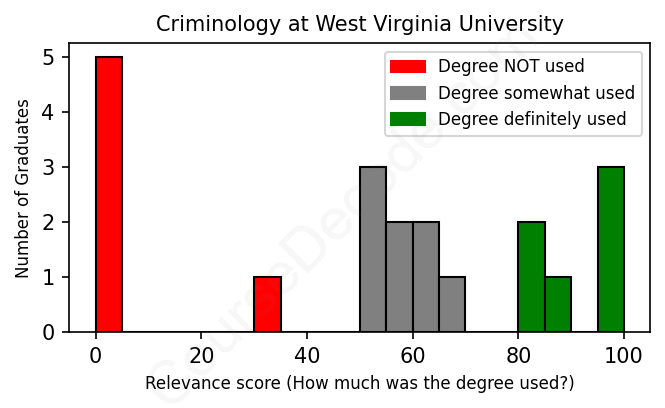
First, some facts. Of the Criminology graduates from West Virginia University we've analyzed , here's how many have used (or NOT used) their degree in their career:

These are estimates based on AI analysis of 20 LinkedIn profiles (see below).
The verdict? Significantly below average. Overall, with an average relevance score of 51%, Criminology graduates from West Virginia University have a much lower likelihood (-16%) of finding work in this field compared to the average graduate across all fields:
And for comparison, here's the chart for all profiles we've looked at across all degrees.
Also, after graduating, 35% of these graduates have pursued further education other than another Bachelor's degree (such as a Masters degree or other), which is right in line with the average across all fields.
See the details:
|
Relevance score: 60% We think this person has gone into a career only somewhat relevant to their degree. We think this person has gone into a career only somewhat relevant to their degree.
DEGREE INFOGraduated in 2016 from West Virginia University with a Bachelors Degree in Criminology. Also pursued further education since (see below). JOB HISTORY SINCE GRADUATIONYouth Worker Non-Profit Organization Nov 2016 - Jun 2017 Child Protective Specialist  Department of Health & Human Services, Victoria Jun 2017 - Jan 2018 Behavioral Health Technician  Achieving True Self Dec 2019 - Present FURTHER DEGREES DONE SINCE GRADUATINGMasters of Psychology: Applied Behavior AnalysisPurdue University Global 2020 - 2022 ABOUTNo information provided. |
The top 10 most common jobs done by the graduates we've analyzed (ranked most common to least) are:
So, when looking at the jobs that folks with a Criminology degree from West Virginia University have landed, it’s pretty clear that there’s a mixed bag. A lot of them stepped into roles that relate directly to law enforcement or security, like Border Patrol Agents, Correctional Officers, and Youth Treatment Counselors. These positions often draw heavily on the core principles of criminology, applying what they learned about criminal behavior and justice systems in their day-to-day work. On the flip side, many graduates found themselves in roles that don’t really tap into their criminology expertise at all, like sales positions, logistics roles, or even teaching in a special education context. You’d think with a degree in criminology, they'd be using that knowledge more, right?
Overall, while some alumni took paths that put their criminology skills to good use—especially in law enforcement and social services—a significant number ended up in jobs that don’t align closely with their studies. It seems like there’s definitely a need for criminology graduates in specific fields, but there are also plenty of paths where that knowledge might just sit in the backseat doing nothing. It’s a reminder that not every degree leads straight into a job where you’re actively using what you studied every day. And that’s okay; sometimes, it’s more about the skills you pick up along the way rather than the title on your diploma.
Here is a visual representation of the most common words in job titles for Criminology graduates (this is across all Criminology graduates we've analyzed, not just those who went to West Virginia University):

Graduates from the Criminology program at West Virginia University seem to follow a diverse range of career paths, with many finding their first roles in law enforcement, security, and related fields. For instance, several graduates took on positions as Transportation Security Officers, Correctional Officers, or roles within the U.S. Customs and Border Protection shortly after graduation. This suggests that a significant number of students enter directly into jobs that align well with their criminology background. Others have opted for roles in teaching or youth counseling, which, while less traditional for criminology graduates, still connect to the field in aspects like social justice and rehabilitation.
As the years go by, the trend appears to shift slightly. About five to ten years post-graduation, many graduates seem to have moved into more specialized roles. Some became Directors of Security, Investigators in financial crime (like at U.S. Bank), or even took on higher administrative roles within various organizations, demonstrating career progression. However, there are also indicators that some graduates may have drifted into unrelated fields, such as sales and logistics, which suggests that while many do find success relevant to their studies, others might not fully leverage their criminology degree in the long run. Overall, it's a mixed bag, but many certainly seem to carve out meaningful paths that resonate with criminological principles.
Getting a Bachelor's degree in Criminology at West Virginia University—or really anywhere—can be a bit of a mixed bag. It’s not usually considered one of the hardest degrees out there, especially compared to things like engineering or physics, but that doesn't mean it's a walk in the park either. You’ll dive deep into subjects like criminal behavior, law, and sociology, which requires some serious reading and critical thinking. If you’re passionate about understanding crime and justice, it can be pretty interesting, but if you’re not into writing papers and doing research, it might feel challenging. Overall, it's got its tough spots, but if you put in the effort and stay engaged, you can definitely handle it!
Most commonly, in the LinkedIn profiles we've looked at, it takes people 4 years to finish a Bachelor degree in Criminology.
So, looking at the job histories of these West Virginia University Criminology grads, it seems like their earnings vary quite a bit. Some of them have landed solid gigs with government agencies like the TSA and the U.S. Customs and Border Protection, which usually come with decent pay and benefits, while others took roles in more entry-level positions, like security officer or educator, which typically don’t pay as well. A few grads who progressed into managerial roles (like the Operations and Account Manager positions) are likely making better money as they gain experience. Overall, it seems like there’s a mix of good earning potential for some and more modest pay for others, depending on the path they chose after graduation.
Here is a visual representation of the most common words seen in the "about" section of LinkedIn profiles who have a Bachelor degree in Criminology (this is across all Criminology graduates we've analyzed, not just those who went to West Virginia University). This may or may not be useful:

Here are all colleges offering a Bachelor degree in Criminology (ordered by the average relevance score of their Criminology graduates, best to worst) where we have analyzed at least 10 of their graduates:
| College | Score | Count |
|---|---|---|
 California State University, Fresno California State University, Fresno
|
67 | 20 |
 George Mason University George Mason University
|
63 | 27 |
 Arizona State University Arizona State University
|
58 | 17 |
 Missouri State University Missouri State University
|
57 | 11 |
 The Ohio State University The Ohio State University
|
56 | 16 |
 Penn State University Penn State University
|
55 | 16 |
 Florida State University Florida State University
|
54 | 60 |
 West Virginia University West Virginia University
|
51 | 20 |
 University of Maryland University of Maryland
|
51 | 11 |
 John Jay College (CUNY) John Jay College (CUNY)
|
50 | 21 |
 University of South Florida University of South Florida
|
49 | 47 |
 Central Connecticut State University Central Connecticut State University
|
49 | 13 |
 University of Florida University of Florida
|
48 | 21 |
 The University of Texas at Dallas The University of Texas at Dallas
|
48 | 10 |
 Indiana University of Pennsylvania Indiana University of Pennsylvania
|
48 | 20 |
 Mississippi State University Mississippi State University
|
46 | 10 |